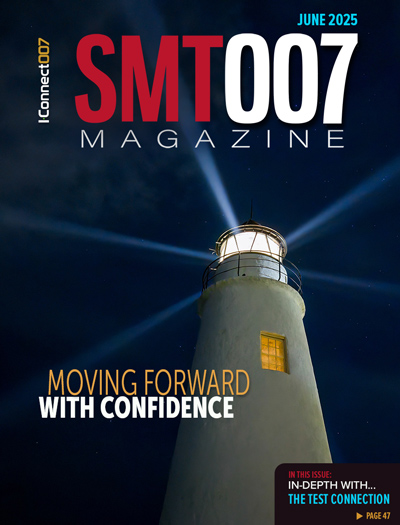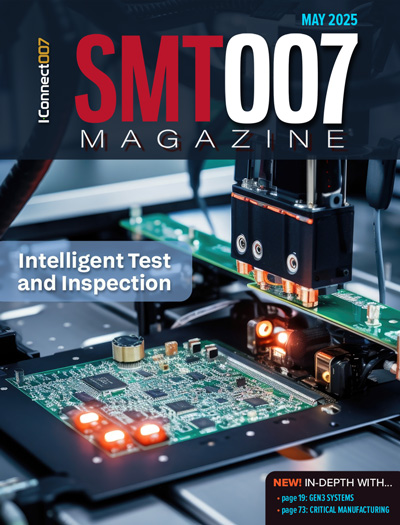-

- News
- Books
Featured Books
- smt007 Magazine
Latest Issues
Current Issue
What's Your Sweet Spot?
Are you in a niche that’s growing or shrinking? Is it time to reassess and refocus? We spotlight companies thriving by redefining or reinforcing their niche. What are their insights?

Moving Forward With Confidence
In this issue, we focus on sales and quoting, workforce training, new IPC leadership in the U.S. and Canada, the effects of tariffs, CFX standards, and much more—all designed to provide perspective as you move through the cloud bank of today's shifting economic market.

Intelligent Test and Inspection
Are you ready to explore the cutting-edge advancements shaping the electronics manufacturing industry? The May 2025 issue of SMT007 Magazine is packed with insights, innovations, and expert perspectives that you won’t want to miss.
- Articles
- Columns
- Links
- Media kit
||| MENU - smt007 Magazine
Perspectives from a First-Timer
July 25, 2017 | Patty Goldman, I-Connect007Estimated reading time: 6 minutes
Brad Heath, president and CEO of EMS company VirTex, is a first-time attendee of IMPACT Washington D.C. In an interview with I-Connect007 Managing Editor Patty Goldman, he talks about his impressions after the first day of the recent IMPACT Washington D.C. event, and how he thinks the industry benefits from such meetings with the policy makers in the government.
Patty Goldman: Brad, I understand this is your first IMPACT event. At the end of our first full day, what are your impressions?
Brad Heath: It’s like drinking from a fire hose. It’s a full day, with full sessions. Just very comprehensive.
Goldman: What did you think of this morning’s speakers?
Heath: I thought they were great. They addressed all the different areas that really impact what we’re doing. We had discussions with the Department of Education, the Department of Commerce, and the Department of Defense. It was truly impactful.
Goldman: I was impressed because they all said, "We need to hear from you." Every one of them said, "We want to hear from you. Here’s what we can do. Here’s how you can contact us."
Heath: We heard the same thing up at the EPA, where they said, "We need to make stuff move faster." We tell them the problem and they say, “Why did we do that? We need to consider why we put this regulation in place.” If it doesn't impact [the environment], if it doesn’t change anything, but you spend a lot of time and effort doing paperwork for it, that doesn't make sense. It should only be applied to the people who need to go do it. For one example, they took the reporting level from 25,000 pounds down to 100 pounds. All types of people must report now, who didn’t before. They’re looking at, "How can we do it differently?"
Again, I hadn't been here before, but I've been really surprised by how receptive people from the different departments were—wanting to hear what the industry has to say, and wanting to understand our concerns, our needs, and how they can make a difference to help us create more jobs.
Goldman: I can understand a little bit better this morning why they were working with us, but with the EPA there certainly has been an adversarial attitude in the past.
Heath: You bet. What I’ve been told is that since the new administration came in, the time to get a meeting, the willingness to take meetings, and the willingness to do things, listen and move stuff forward, is just remarkably different.
Goldman: You know, I told a lot of people, “This is the year to go to IMPACT.” This is the best opportunity to get our message across, with everybody so willing to listen, and almost begging for information.
Heath: Right. They’re saying, “Here’s my email, if you have ideas send me this information. We don’t know enough about this. You need to send us the information you have so we can look at what we can do about it.”
Goldman: I wanted to ask the fellow from commerce, if it made a difference to hear from individuals versus, say, IPC representing everybody. IPC represents the whole industry, but does it make a difference to hear from individuals? My guess is yes. The more individuals they hear from, the more companies they hear from and the bigger the impact.
Heath: I would guess that’s probably especially true if they start hearing the same patterns and the same trends over and over from different individuals. Even though most of us in the industry are doing similar things—companies are different sizes, in different locations—but the headaches we’re dealing with are pretty much the same, like workforce development, skills gap, over-regulation, taxes, healthcare, all those things.
Goldman: Hearing it from all over the country has got to make an impression.
Heath: Yes. My guess is it’s not the first time they’ve heard any of these issues pop up. They probably would hear it as they talk to other industries as well. IPC will be presenting two awards tonight to senators.
Goldman: Excellent. We’ll have two people from the Senate hearing from us and we’ll be hearing from them. It’s really a two-way street. You pick up a lot from them and we learn their views and a little inside info on the workings on the Hill.
Heath: Then tomorrow we’re going to head to the Hill. Go pound the message into the Senate, I guess. We’ll have some group sessions and then I’ll stay over tomorrow afternoon and I’ll have some meetings with individuals from Texas and Wisconsin, which is where we have our facilities.
Goldman: You’ll be able to speak with both. That’s wonderful.
Heath: That’s the hope. That’s what they (IPC staff) are trying to get set up.
Goldman: You can imagine all the other industry groups that are also pulling at them, which has got to make it tough for scheduling. That’s why we don’t always get to speak to the senators and representatives themselves.
Heath: That’s so true. But it’s amazing when you get them out into your facilities. Over the last four or five months now, we’ve had the staffers from several of our Congressmen’s office come through our Texas and Wisconsin facilities. We had Congressman Michael McCaul come through the Austin facility. That was great—we’re getting in front of them. When they come through and look at it they’re saying, “We had no idea this is what electronics manufacturing was like.” They had no clue.
Goldman: It’s possible they’ve never been in manufacturing facility at all. They think it’s going to be dirty and smelly and rough; manufacturing is a dirty word to them, I suppose.
Heath: Well, they see the pictures of the facilities where people are putting stuff down by hand. That’s what they think you’re doing.
Goldman: It’s nice to show them something different.
Heath: But in manufacturing there’s a big cross-section. It’s Anglo, it’s Hispanics, it’s Asians, it’s African-Americans, it’s Indians, you name it. There’s probably no broader cross-section of a workforce than the manufacturing workforce. It’s extremely diverse. It’s diverse in terms of age. It’s diverse in terms of gender. It’s diverse in terms of ethnicity. You name it, it’s there in manufacturing.
Goldman: That’s true—and manufacturing is a very broad term itself. It’s ranges from somebody doing the same thing repeatedly to people who push buttons and oversee things being built. Big things happen. Anything else come to mind here?
Heath: Looking forward to tonight and Day Two. For as busy as today was, I’d just as soon go to my bed tonight, but I’m going to the dinner.
Goldman: Oh, you definitely want to go to dinner because there will be two senators who will be worth listening to. You want to hear from more than just your own Congressmen.
Heath: A day like this will wear you out, but it’s worth doing. Somebody has got to do it.
Goldman: It is definitely worth it. These people seem to run from one thing to the other, though. Apparently, they’re very tightly scheduled. They’ve got no extra time.
Heath: They seem to run from one appointment to another—and they do this every day.
Goldman: No wonder it’s difficult to get things scheduled. IPC did a fantastic job getting people from Education, Commerce and DOD this morning and then the top guy at EPA and staffers from Pence’s office this afternoon.
Heath: They did. It’s a great town here [Washington, D.C.].
Goldman: Thank you so much for your time, Brad.
Heath: You bet. Absolutely.
This article was originally published in the July 2017 issue of SMT Magazine.
Suggested Items
Zollner Completes Full Acquisition of Bluechips Microhouse
07/01/2025 | Zollner Elektronik AGZollner Elektronik AG has successfully finalized its com- plete takeover of Bluechips Microhouse Co., Ltd., in Thailand. In the future the company will operate as part of the Zollner Group of companies under the leadership of Thomas Kiefl – strategically networked, technologically focused and internationally oriented.
Inission Acquires the Lithuanian Company Selteka
07/01/2025 | InissionInission AB has signed an agreement to acquire 100% of UAB Selteka. Selteka is a well-respected EMS (electronics manufacturing services) company with operations located in Kaunas, Lithuania.
Kitron Strengthens Order Backlog with EUR 11 Million Contract for Defense Communication
07/01/2025 | KitronKitron has received an order valued at EUR 11 million to produce advanced military communication products destined for the European market.
IMI Wins Gold Award for Best Managed Technology Company at FinanceAsia’s 29th Asia’s Best Companies Awards
07/01/2025 | IMIIntegrated Micro-Electronics Inc. (IMI) has been awarded the prestigious Gold Award for Best Managed Technology Company at the 29th edition of the Asia’s Best Companies Awards, hosted by FinanceAsia.
Compal Announces Completion of New Automotive Electronics Facility in Poland, Signaling Strategic Growth in Europe
06/30/2025 | Compal Electronics Inc.Compal Electronics is proud to announce the completion of Phase One of its new manufacturing facility in Czeladź, Silesian Voivodeship, Poland, marking a major milestone in its strategic expansion into the European automotive electronics market.


